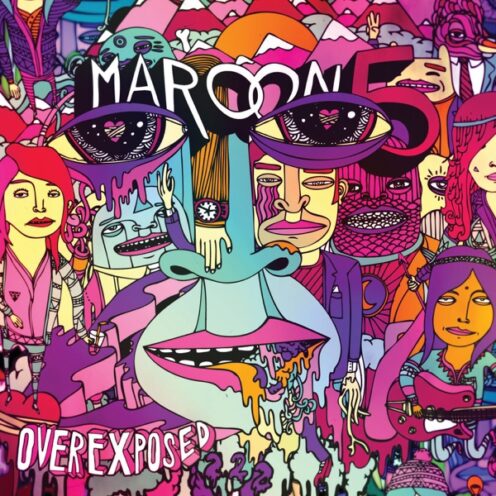
Even though Maroon 5 always seemed to have a place in mainstream relevance, it was obvious that their powerhouse level fluctuated throughout the years. Maroon 5’s breakout debut record, Songs About Jane, saw late success in 2004 (it was first released in 2002) reaching impressive heights with 3 top 20 singles and over 9 million copies sold worldwide. While their follow-ups hit benchmarks that some artists dream about (platinum and double platinum, respectively), they still never quite measured up to what Janeachieved, and what the band is capable of executing in general.
Maroon 5 agreed with that as well, and they decided to take action. After the lackluster performance that 2010’s Hands All Over brought upon them, their biggest hit to date came in the form of standalone single “Moves Like Jagger.” It was then that after 10 consecutive weeks of “Moves Like Jagger” sitting at the #1 spot that the band realized they were probably onto something. “Moves Like Jagger” marks the first time that Maroon 5 worked with an outside writer and multiple producers on material, and it clearly yielded phenomenal results. Their new album, Overexposed, follows that same formula. While co-writers can be the death of some artists — it brought Maroon 5 to their creative peak and helped them construct their finest offering yet.
Frontman Adam Levine stated that Overexposed is the group’s poppiest record that they’ve done, which is a bit of a silly statement given Maroon 5’s previous pop credentials. His exclamations became easier to understand with the release of the lead single, “Payphone,” which is by far the most explosive single in the band’s catalog. Backed by massive production and pounding bass, Levine’s soulful vocals make its triumphant return in the mid-tempo ballad. An unnecessary cameo from rapper Wiz Khalifa could have taken away from the song’s accessibility, but its monster chorus keeps it on track and is the reason why it’s dominating the airwaves.
Levine’s vocals as a whole are still as masterful as ever, providing the lifeline to each number even when they aren’t up to their conventional rock pace. Additionally, the co-penned Savan Kotecha (One Direction, Justin Bieber) track, “One More Night,” carries a reggae-fueled tinge early on to Overexposed, and further affirms that it’s more than just a run of the mill pop album. Other aspects include multiple ballads (“Love Somebody”, “Sad”), some club smashes, (“Doin’ Dirt”, “Tickets”) and even a few dance-rock hybrids (“Lucky Strike”, “The Man Who Never Lied”) — all while still maintaining their contemporary edge.
While not every song is up to a “Moves Like Jagger” or “Payphone” standard hook-wise, the co-writers and producers never stopped breaking into new grounds for the band throughout the record. As a result, Maroon 5 is introduced to foreign boundaries they’ve yet to cross until now, which is a breath of fresh air for a group that not too long ago seemed to be on their way out. With the success that this album will inevitably bring, it’s clear that overexposure is exactly what suits Maroon 5 best.